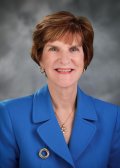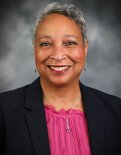Duke University School of Nursing’s new Racial Justice Task Force has been diligently working since its formation this summer to tackle their charge of making DUSON a more inclusive, diverse environment.
The task force stems from the call for a Racial Justice Action Plan established by the Dean’s Office and Office of Diversity and Inclusion. It is in alignment with Duke University President Vincent E. Price’s request for a university-wide commitment to foster a more diverse and inclusive atmosphere at every level and the Moments to Movement initiative by A. Eugene Washington, M.D., Chancellor for Health Affairs, Duke University, and President and CEO, Duke University Health System (DUHS).
 “The Racial Justice Task Force is a pivotal step in moving our School forward during such a trying time in our society and in ensuring that every student and faculty and staff member who chooses DUSON now and in the future feels welcomed and valued,” said Marion E. Broome, PhD, RN, FAAN, dean and vice chancellor for nursing affairs and Ruby Wilson Professor of Nursing, School of Nursing, Duke University, and associate vice president for academic nursing, DUHS.
“The Racial Justice Task Force is a pivotal step in moving our School forward during such a trying time in our society and in ensuring that every student and faculty and staff member who chooses DUSON now and in the future feels welcomed and valued,” said Marion E. Broome, PhD, RN, FAAN, dean and vice chancellor for nursing affairs and Ruby Wilson Professor of Nursing, School of Nursing, Duke University, and associate vice president for academic nursing, DUHS.
The task force comprises 27 members selected to represent a diverse set of students, faculty and staff. The group has met regularly since July to tackle their charge “to engage the DUSON community in developing and/or making recommendations to improve individual and system structures to address racial injustices and/or inequities which exist currently within DUSON,” as stated on the Racial Justice Task Force website.
The Five Workgroups
After utilizing Design Thinking as a problem identification tool, five workgroups were established in order to thoroughly address the different themes identified: Accountability, Anti-racism and Racial Justice Education, Educational Practices for Equity, Recruitment, Hiring, Advancement and Retention, and Student Admissions, Sense of Belonging and Resources.
The purpose of each group is as follows:
- Accountability: Holding individuals responsible for individual development and behavior change related to racial justice
- Anti-racism and Racial Justice Education: Promoting a racially just environment at DUSON
- Educational Practices for Equity: Plan to enhance curricular, simulation and clinical education content to promote racial equity across programs
- Recruitment, Hiring, Advancement and Retention: Creating and supporting a diverse workforce
- Sense of Belonging and Resources: Increase equity across all programs for admissions, resources and sense of belonging
At the center of the task force are the five people who provide leadership, coordination and guidance to the five groups. In addition to Broome, this core group includes Brigit M. Carter, PhD, MSN, RN, CCRN, associate dean for diversity and inclusion, Diane Uzarski, DNP, MPH, RN, chief of staff, Monica Russell, Office of Diversity and Inclusion program director, and Heather Mountz, DUSON Community Health Improvement Partnership Program coordinator.
 “The workgroups were decided upon after evaluation of the charge presented to the task force,” Carter said. “We have at least one student, one faculty and one staff member per group to make sure each perspective is properly represented.”
“The workgroups were decided upon after evaluation of the charge presented to the task force,” Carter said. “We have at least one student, one faculty and one staff member per group to make sure each perspective is properly represented.”
In order to accomplish their goals, the workgroups have had to intermingle across groups and engage with people outside the task force.
The Recruitment workgroup, which Mountz overlooks, is vetting hiring, advancement and promotional processes for employees in order to check for biases. Just over the course of a week, the team met with David Bowersox, MBA, associate dean of finance and administration, Barbara S. Turner, PhD, RN, FAAN, Elizabeth P. Hanes Professor of Nursing, Marilyn H. Oermann, PhD, RN, ANEF, FAAN, Thelma M. Ingles Professor of Nursing, Crystal Arthur, director of faculty affairs, and Valerie M. Howard, EdD, MSN, RN, ANEF, CNE, FAAN, associate dean for academic affairs and professor. The Recruitment workgroup then met with Duke Human Resources to make certain they were considering all the applicable information. “We were able to get a lot of really good information,” Mountz said. “One of the things that we found is that there's a lot of misinformation or misunderstanding in terms of how some things are working. One of the recommendations for our workgroup is to figure out how to either clearly display those processes for hiring or salaries or to determine other ways that we can make sure that everyone understands that we are trying as best as we can to hire diverse populations.”
Timeline
The Racial Justice Task Force has set benchmarks for themselves to keep their work on track:
- August 22: Recommendations will be sent to Washington.
- September 16: Phase Two will begin. Workgroups reconvene, with expanded membership to include additional expertise, after a brief break.
- December 5: Workgroups will submit final recommendations with specific strategies, measures, budgetary and priority recommendations.
- February 12: Task force will prioritize plan recommendations and create a final plan.
- March 1: The final plan will be shared with the DUSON community for feedback.
- March 8: Beginning of formal implementation phase.
- September 10, 2021: The Office of Diversity and Inclusion will publish its first Racial Justice Action Plan report for the DUSON community.
“Although this is an ambitious schedule, we have seen in Phase One that our  task force members have made this body of work a priority and top of mind to assure our community we are taking our responsibility seriously and commit to making these ideas come to fruition,” Uzarski said.
task force members have made this body of work a priority and top of mind to assure our community we are taking our responsibility seriously and commit to making these ideas come to fruition,” Uzarski said.
Moving forward
The DUSON community will be able to connect and engage with the task force throughout the year through town halls, surveys and other existing community groups. To remain communicative and transparent, the task force has made its meeting notes and other communications available online (link is at the bottom of the page).